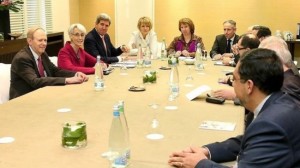 Representatives from Iran and the six world powers during nuclear talks in Geneva, November 9, 2013[/caption]
Representatives from Iran and the six world powers during nuclear talks in Geneva, November 9, 2013[/caption]Iran�and world powers may struggle to meet a self-imposed July deadline to agree on long-term limitations to the nation�s nuclear work in return for sanctions relief, according to former diplomats and analysts.
Iranian Foreign Minister Mohammad Javad Zarif and European Union foreign-policy chief Catherine Ashton meet today in Vienna. Diplomats from�China,�France,�Germany,�Russia, the U.K. and the U.S., the so-called P5+1, convene meetings with their counterparts from Iran tomorrow for the first round of talks since reaching their Geneva accord in November.
�The six-month deadline is tight,� Thomas Pickering, a former U.S. undersecretary of state and ambassador to the United Nations, said in an interview. �If real progress is being made, an extension would certainly be warranted.�
The initial deal, which took effect in January, froze Iran�s most sensitive nuclear work for sanctions relief valued at as much as $7 billion. The U.S. and its allies have accused Iran of seeking nuclear weapons, a charge it has denied during the decade-long dispute.
Iranian Supreme Leader Ayatollah Ali Khamenei reiterated that he doesn�t expect talks to yield an agreement.
Government �officials think that within the nuclear issue negotiations will solve problems,� Khamenei said today at a ceremony in Tabriz, Iran, commemorating the 1979 Islamic Revolution. �I am not an optimist and it won�t get anywhere but I have no opposition� to talks, he said.
Possible Extension
The current deal, which eases curbs on trade in auto and airplane parts, precious metals and petrochemicals, may be extended if the sides can�t win a new agreement by July and talks show progress, U.S. officials have said.
�The next five months are very unlikely to see a full agreement but there are strong prospects of a clear road map,� said Paul Rogers, global-security specialist at the Oxford Research Group, a London-based conflict-advisory group. An agreement may emerge �quite possibly over one to three years.�
Iran, with the world�s No. 4 proven oil reserves, risks having its nuclear facilities attacked by�Israel�or the U.S. if negotiations fail. Progress in talks has weighed on oil prices as traders have speculated more Iranian crude could enter the market and the probability of a conflict has fallen.
Contentious Issues
Negotiators are likely to define the most contentious subjects, separating them before trying to find mutually acceptable compromises, according to Pickering, who is a member of�The Iran Project, a group that wants to improve U.S. relations with Iran. Uranium enrichment, plutonium production, international inspections and Iran�s alleged weapons work during the 1990s should be on the agenda, he said.
�It is standard negotiating procedure for states to set out their maximalist positions, a situation all the more challenging because they have domestic constituencies to appease,� said Paul Ingram, executive director of the London-based British-American Security Information Council. �It is so rare to see rapid improvements, and why we have to consider the most likely outcome of the six-month interim period is an further extension.�
By Bloomberg�
The Iran Project is not responsible for the content of quoted articles.










